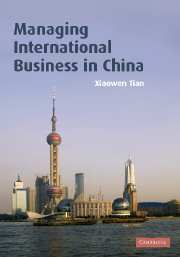Book contents
- Frontmatter
- Contents
- List of figures
- List of tables
- List of boxes
- Preface
- 1 Introduction
- 2 Look before you leap
- 3 Manage guanxi strategically
- 4 Select an entry mode
- 5 Form an alliance
- 6 Negotiating with Chinese partners
- 7 Production operations management
- 8 Marketing management
- 9 Human resource management
- 10 The protection of intellectual property rights
- 11 Corporate finance considerations
- References
- Index
- References
10 - The protection of intellectual property rights
Published online by Cambridge University Press: 05 June 2012
- Frontmatter
- Contents
- List of figures
- List of tables
- List of boxes
- Preface
- 1 Introduction
- 2 Look before you leap
- 3 Manage guanxi strategically
- 4 Select an entry mode
- 5 Form an alliance
- 6 Negotiating with Chinese partners
- 7 Production operations management
- 8 Marketing management
- 9 Human resource management
- 10 The protection of intellectual property rights
- 11 Corporate finance considerations
- References
- Index
- References
Summary
Despite China's achievements in developing a comprehensive body of laws on intellectual property rights (IPR), effective IPR enforcement in China remains a serious problem . […] These weaknesses mean that in the near term, foreign companies will continue to encounter trademark, copyright, patent, and trade-secret infringements in virtually every sector (Ann M. Weeks (2000, p. 28)).
The infringement of intellectual property rights is a very serious problem in China. Although the government has made great efforts to comply with the WTO regulations on intellectual property rights since accession in 2001, the enforcement of IPR laws and regulations remains ineffective in China even today. The protection of IPR is a daunting challenge to transnational corporations entering the Chinese market, particularly those with established brand names. In this chapter we discuss in section 1 the scale of the widespread IPR infringement in the country, and the reaction from the international community to the problem. In section 2 we discuss China's IPR regime, with a focus on the laws and regulations regarding IPR and the enforcement of these laws and regulations. In section 3 we analyse the shortcomings in the current Chinese IPR regime. In section 4 we discuss some practical measures that TNCs can take to protect their IPR in the face of the large-scale violation and ineffective IPR enforcement in the country.
- Type
- Chapter
- Information
- Managing International Business in China , pp. 229 - 252Publisher: Cambridge University PressPrint publication year: 2007



